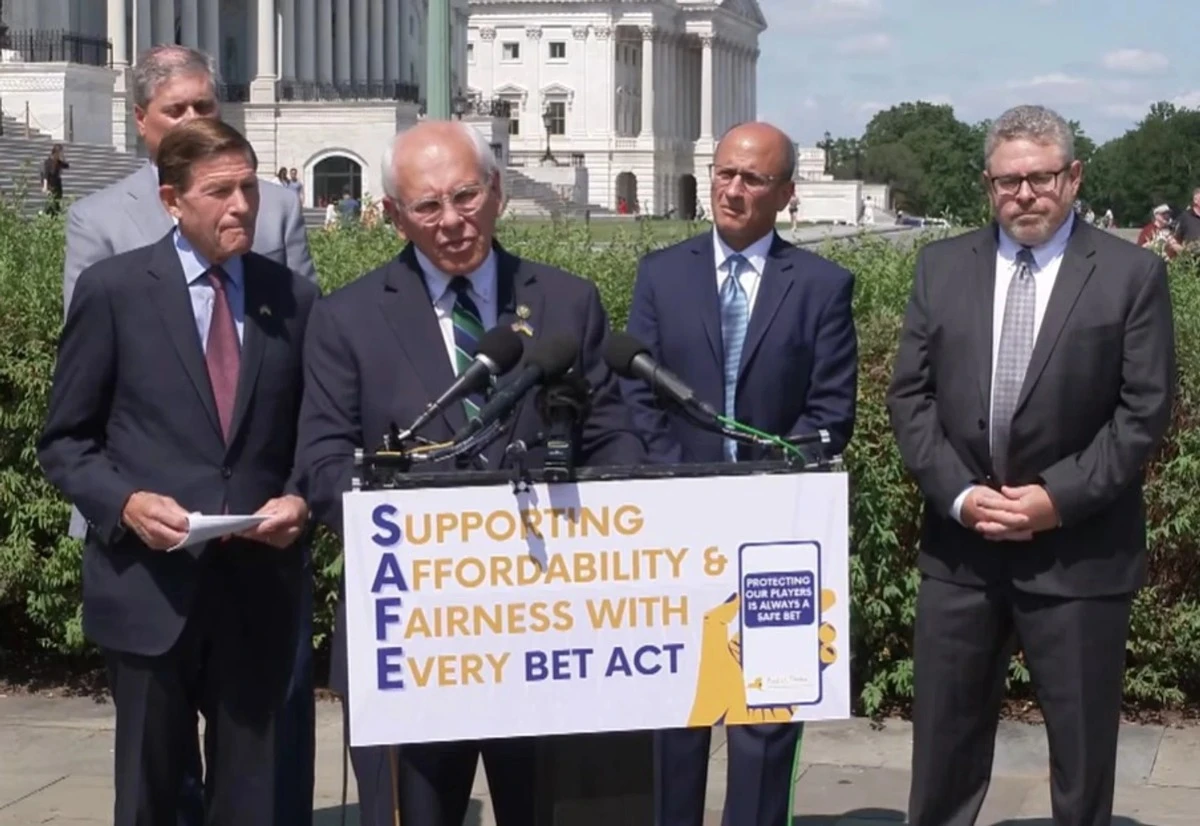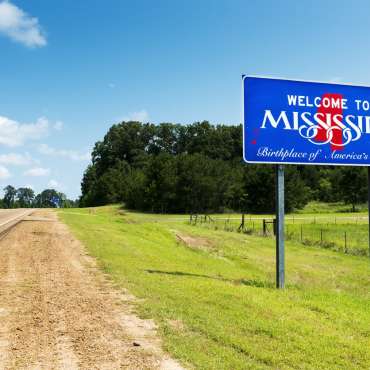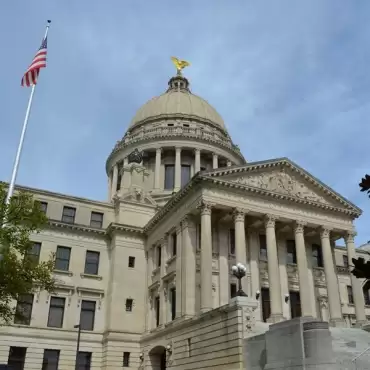It turns out that no one – not even problem and responsible gambling advocates – are embracing the SAFE Bet Act, unveiled at a press conference earlier this month by US Representative Paul Tonko and Senator Richard Blumenthal. It's already been publicly called "obnoxious" and "insulting".
The SAFE Bet Act attempts to reverse the 2018 Supreme Court decision to make legal sports betting a states’ rights issue. It does not yet have a bill number and has not been filed. UCLA clinical professor of psychology Dr Tim Fong said the current version of the bill would “do more harm than good”.
Jeff Ifrah, a gaming lawyer and a founding member of iDevelopment and Economic Association (iDEA), told iGB that the bill is a lot to process because “the first suggestion out of the gate [is] to include an unconstitutional registration requirement”. He also said the bill sponsors appear to be trying to “fill some sort of need that doesn’t exist”.
There is much not to like about SAFE Bet Act, say those in the industry and responsible gaming advocates. But from the PG and RG side, there is at least a little to embrace. Keith Whyte, executive director of the National Council on Problem Gambling (NCPG), says the bill shows that “problem gambling is being increasingly seen as a national public health issue”.
He continued: “It’s emblematic of the renewed attention in congress to make sure that the federal government gets involved in addressing problems. Setting aside the (issues) of the bill, it shows that members of congress are paying attention.”
Sounds good, but…
What, exactly, is in the SAFE Bet Act? It’s a good question and one that not many people are privy to, since the bill has not yet been filed. iGB obtained the text of the proposal. The proposal goes well beyond creating the national framework for problem and responsible gambling that advocates crave. It would require legal betting states to get permission from the federal attorney-general to continue offering betting. Approval would be valid for three years. Given that 38 states plus the District of Columbia already have legal wagering, any change or additional layer of regulations could wreak havoc.
The proposal would require the creation of a national self-exclusion list available to all. The department of health would be tasked with maintaining the list and operators would be required to share information in real time. Implementing such a list would be a challenge, as evidenced by the struggles that jurisdictions and operators already face compiling – never mind sharing – these.
The American SAFE Bet Act seeks to create a national self-exclusion list for online sports gambling. Implementing it will be the tricky part. Here's an example of a national self-exclusion list failing.https://t.co/Az9t6IsCF8
— Gambling Harm (@GamblingHarmOrg) September 24, 2024
An annual survey by the surgeon-general on the “scope of problem gambling and gambling-related harm experienced by using online sports betting” would be mandated. And operators would be required to set aside an “appropriate amount” of revenue for problem and responsible gambling. No US jurisdiction currently requires this. Rather, US jurisdictions earmark a percentage of gambling tax revenue for such programmes. Operators often spend their own money to develop tools and messaging.
SAFE Bet isn’t broad enough
Problem and responsible gambling advocate Brianne Doura-Schawohl sees value in these ideas.
“To hear a member of the senate and house speak urgently and eloquently about this issue was gratifying,” Doura-Schawohl, a DC-based consultant, told iGB. “To see government agencies like SAMHSA (Substance Abuse and Mental Health Services Administration) and the CDC, that have successful track records of treating public health issues, incorporated into this is wonderful.”
But Doura-Schawohl is wary, pointing to the narrow scope of the SAFE Bet Act. The proposal would only put a national framework around sports betting. She says that from a mental-health perspective, that could have unintended consequences. In addition, she said, “if we are going to address this as a public-health issue, we have to address all types of gambling.”
Tough words from regulator, US representative
Reactions from regulators and those working closely with operators weren’t as kind. Former New Jersey chief regulator David Rebuck called the proposal “obnoxious” when speaking on an iDEA Growth panel last week. He went on to use the word “arrogance” when referring to the federal lawmakers.
Federal legislators slammed over 'half-baked' sports-betting comments as Massachusetts, New Jersey officials critical of SAFE Bet Act. U.S. senator called state regulation "faint hearted and half-baked" @VixioRegulatory https://t.co/z114uCu1F4 pic.twitter.com/KUsjBxBEhI
— Chris Sieroty (@sierotyfeatures) September 24, 2024
Lawmakers were equally as direct. Dina Titus, the Nevada representative in congress representing Las Vegas, released this statement: “While the SAFE Bet Act is perhaps well-intentioned, pre-empting state gaming regulators by outlawing most forms of advertising and restricting the types and methods by which customers can place bets is a misguided approach.”
At an event hosted by Semafor, she said: “I certainly support responsible gaming. The industry does. They’ve taken bold steps, going back to the ’90s, to regulate themselves and I think that’s better, to have self-regulation or state regulation, not have the federal government get involved at this level.”
Asked about the SAFE Bet Act sponsored by Rep. Paul Tonko, @repdinatitus tells @eschor:
"I think that's better to have self-regulation or state regulation, not to have the federal government get involved at this level." pic.twitter.com/3xvmgKxewp— Semafor (@semafor) September 19, 2024
Some say the proposal is “unconstitutional”
And that is the rub. The SAFE Bet Act was initially sold as a federal framework for problem and responsible gambling. It has strayed from that core mission. The GRIT Act, filed in January, is true to that goal. It would fund programmes with an existing federal excise tax. The proposal would take half of the excise tax and funnel it to problem and responsible gaming at the state and federal level. The proposal earmarks 75% of tax revenue to go back to states for treatment and education. The remaining 25% would fund federal research into gambling addiction.
Blumenthal was also a sponsor on that bill. Many operators don’t favour it but, compared to the SAFE Bet Act, GRIT may start to look appealing.
The SAFE Bet Act, according to Ifrah and consultant Brendan Bussmann, is unconstitutional. Bussmann contends that the building blocks for America dictate that the “states be in control with relation to important issues”. Bussmann called it just “one piece of bad legislation that muddies the water”.
He points to the Supreme Court’s decision to overturn PASPA as a good example of federalism. It essentially returned the decision about whether to offer wagering to states. Bussmann also pointed to Roe vs Wade as another example. One might also mention border control, cannabis or gun control. All have been central and contentious political issues that states and the federal government have wrestled with.
Gambling isn’t like other addictions
Fong would agree. While he says that there is some federal involvement in issues around public-health concerns, like alcohol, tobacco or cannabis, federal funding for gambling addiction isn’t “in the same ballpark”. Beyond that, he said sports betting sits in a “weird” spot – it’s not the same as a drug or alcohol addiction and, in some ways, it is more akin to other addictions that are not recognised by the federal government.
“With tobacco and alcohol, the number one issue is death,” Fong said. “And there are other issues, like co-morbidities. In gambling, there is some death, but there are other issues that are very hard to keep track of, like money lost or families broken.
“What [betting] is most similar to is consumption of adult entertainment – online shopping, video gaming,” he continued. “All of the same things that cause a dopamine rush. Where is our federal guidance on roller coasters? Sports betting sits in that weird area where it’s kind of the same thing but it’s not.”
Ban on in-play, college-player props
The proposal also calls for a national ban on college-player proposition bets and in-play betting. Some states allow college-player props and all legal digital wagering US jurisdictions allow in-play betting.
That prohibition will surely get pushback from the industry. In-play betting is a quickly growing sector of the betting business. And for a company like microbetting specialist Betr, it is the cornerstone of the business.
Today's column covers two of the most contentious topics in sports betting: limiting sports bettors and the SAFE Bet Act.
I have many thoughts on the topics, but the overarching theme is that everyone is trying to solve the problems by answering the wrong question.
Read and… pic.twitter.com/CZt8RlZQ79— Steve Ruddock (@SteveRuddock) September 20, 2024
Professional sports leagues may also be uncomfortable with that prohibition – none directly offer wagering, but the four major US professional leagues and many of their member teams have partnerships with sportsbooks. Some have sportsbooks located at their facilities. Details of those partnerships aren’t public, but its probable that some of the those deals involve a percentage of the wagers placed. Fewer wagers would equal less revenue.
An in-play betting ban would also affect some suppliers. Companies like Sportradar and Genius Sports provide the data feeds used to settle in-play wagers.
Prohibitions would prop up black market
The NCAA has been lobbying US jurisdictions to prohibit college-player prop bets since the spring. Some states had such a ban in place and others have since implemented one. The NCAA argues that banning such bets will help to limit the harassment it says college athletes often face.
But regulators in some states aren’t so sure that limiting bets will solve the problem. A recent study commissioned by the Canadian Gaming Association revealed that regulators may be moving forward too quickly with regards to issues related to responsible gambling. The study results could easily be applied in the young US market.
Operators argue that bans on any kind bets would send some players to the black market. There seems to be no question that a blanket ban on in-play wagering would not only hurt operators’ bottom line, it would send consumers, who have now had a taste of it, offshore.
“I’ve never seen a piece of legislation inflate the illegal market more,” Bussman said.
National betting age, ad bans
The SAFE Act also calls for a national betting age of 21. Several states, including Kentucky, have set the age at 18. The bill also outlines stringent advertising rules, including banning sportsbook advertisements between 8am-10pm local time, which is well beyond any state’s current rules.
Time for some evening industry news tweets… a Canadian Senate committee is about to hear more testimony in connection with Bill S-269, which aims to put in place some nationwide guardrails for sports betting advertising. pic.twitter.com/TcIeS5OTIX
— Geoff Zochodne (@GeoffZochodne) September 25, 2024
The federal governments in Australia, Canada and the United Kingdom are also exploring more restrictive advertising hours. The idea to prohibit gambling ads during sports broadcasts has been floated in several countries. But nowhere in the world currently prohibits gambling ads for 14 hours a day.
Other high-level items in the bill
- In order to apply to the federal government for approval to have sports betting, a state must provide its legal wagering law, “identification” of the regulator and an “assurance” from the state attorney-general that the state is equipped to regulate sports betting.
- Federal regulations would tighten up who and where operators can get data to settle wagers. The regulation seems to fall short of an “official league data mandate”, which some states have but others do not.
- Bettors would be limited to five deposits within 24 hours. Operators would be required to do affordability checks at certain thresholds.
- The proposal would ban funding accounts with credit cards, which is currently permitted in some states.
- Artificial intelligence would not be allowed to be used to track wagers of specific individuals, create targeted offers or promotions or to create a “gambling product”.
- Individuals convicted of bribery related to sports contests would not be allowed to wager. But who will provide operators with a list of these people and the information needed to prevent them from wagering?
The proposal also adopts the recent appellate court interpretation that wagers made on tribal platforms are deemed to have been placed where the server is located. In the text, it states that a tribal server must be on Indian lands. This issue was at the heart of the federal case involving a pair of Florida pari-mutuels and the Seminole tribe. The decision ultimately allowed the Seminoles to go live as a monopoly with Hard Rock Bet in Florida.
How about some money to combat the black market?
Given the response, it seems unlikely that the SAFE Bet Act will move forward in its current form. And if it does get filed, some question the timing with a presidential election looming and the possibility of a lame-duck congress later this year.
But if the time comes, Ifrah said he would like to see the federal government use its resources to combat the illegal market.
“We’ve all been looking for more help in combatting offshore gaming,” he said. “Senator Blumenthal, a former AG, he’s into consumer protection measures. But to me the number one issue is keeping people from unknowingly going to unregulated sites. Regulation gives us transparency and accountability on this site. Let’s put some money aside to deal with offshore… it’s not just about tax revenue, it’s about addiction issues that we can’t even see.”
Bussmann wasn’t quite so kind.
“I wouldn’t use this bill to wipe my ass,” he said.




